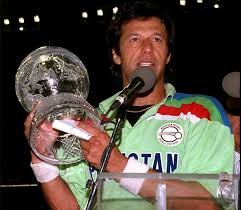Imran Khan: From Cricket Legend to Political Icon – A Journey of Passion and Controversy
Introduction
One of the most important people in Pakistan is Imran Khan, a name that connotes tenacity and change. After becoming a world-renowned cricket player, he turned to politics and became a divisive but revolutionary leader. This blog examines his life story, accomplishments, and the disputes that have shaped his legacy.
The Rise of a Cricket Legend
Early Life and Sporting Beginnings
Imran Khan was born in Lahore, Pakistan, on October 5, 1952, and came from a wealthy family. His early career would be shaped by his love of cricket, which he cultivated while attending Aitchison College and Oxford University.
Captaincy and World Cup Glory
Imran Khan’s cricketing career peaked in 1992 when he led Pakistan to its first Cricket World Cup victory. Known for his charismatic leadership and all-rounder skills, he retired as one of the sport’s greatest icons, with 3,807 runs and 362 wickets in Test cricket.
Philanthropy Post-Cricket
He used his notoriety to pursue humanitarian action after retirement, establishing Shaukat Khanum Memorial Cancer Hospital (1994), a free cancer treatment center named for his mother. His standing as a humanitarian was strengthened by this.
Transition to Politics – Founding PTI
The Birth of Pakistan Tehreek-e-Insaf (PTI)
Disillusioned with Pakistan’s inequalities and corruption, Imran Khan founded the Pakistan Tehreek-e-Insaf (PTI) in 1996 under the name “Movement for Justice.” After being written off as a fringe group at first, PTI progressively acquired support from young people and voters in cities.
Long Road to Power
PTI fought to overthrow the power of long-standing parties like the PML-N and PPP for more than ten years. In the end, Khan’s unrelenting anti-corruption stance and his notoriety paid off. Imran Khan was elected as Pakistan’s 22nd prime minister after the PTI secured a majority in the 2018 general elections.
Key Policies as Prime Minister
- Anti-Corruption Drives: Promised to recover stolen wealth from elites.
- Social Welfare Initiatives: Launched programs like Ehsaas for poverty alleviation.
- Foreign Policy Shifts: Balanced relations with China and the U.S. while advocating for Islamic unity.
Controversies and Legacy
Criticisms and Challenges
Khan’s tenure faced intense scrutiny:
- Economic Struggles: Under his leadership, both inflation and debt skyrocketed.
- Allegations of Authoritarianism: He was charged by critics for suppressing free speech and the press.
- Ties with the Military: Critics claimed his government relied heavily on army support.
Ouster and Ongoing Legal Battles
A no-confidence vote ousted Khan from power in April 2022, making him the first prime minister of Pakistan to be dismissed from office. He has since been dealing with legal issues, such as accusations of corruption that he describes as “politically motivated.”
Legacy and Influence
Millions of people still see Imran Khan as a beacon of hope despite the scandals. His combination of anti-Western sentiment, nationalist rhetoric, and support for Islamic principles changed the political climate in Pakistan. Proponents commend him for his honesty, while critics accuse him of fostering division.
Conclusion
Imran Khan’s life reflects the complexity of Pakistan, a country divided between modernization and tradition. Whether he is seen as a hero or a flawed leader, there is no denying his influence on politics, philanthropy, and athletics. One thing is certain as he gathers fans and faces legal challenges: Imran Khan’s narrative is far from done.







